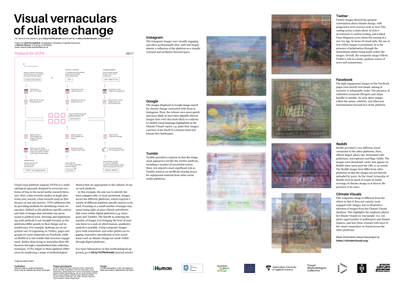Visual cross-platform analysis (VCPA) is a methodological approach designed to overcome two forms of bias in the social media research literature: first, a bias towards studies of single plat- forms and, second, a bias towards analysis that focuses on text and metrics. VCPA addresses this by providing methods for identifying visual vernaculars, defined as the platform-specific content and style of images that articulate any given social or political issue.
IMAGE

In this paper we present visual methodologies attuned to the networked nature of digital images. First, we describe approaches to image research in which images are not separated from their network, but rather studied 'en groupe'. Here, we contrast approaches that treat images as data, and those that regard images as content. Second, we focus on the production of images for digital research, presenting three of their functions: a) the creation of diagrams that facilitate collaboration in interdisciplinary research teams; b) the use of visualizations for cross-platform image analysis; and c) designing images for public participation. Most importantly, such visualizations are not used to form the esthetic culmination of analytical work, but are rather functional tools for digital research that serve parts of the entire research process, from its formulation and operationalization to the engagement of a broader public.
MULTIFILE
This article interrogates platform-specific bias in the contemporary algorithmic media landscape through a comparative study of the representation of pregnancy on the Web and social media. Online visual materials such as social media content related to pregnancy are not void of bias, nor are they very diverse. The case study is a cross-platform analysis of social media imagery for the topic of pregnancy, through which distinct visual platform vernaculars emerge. The authors describe two visualization methods that can support comparative analysis of such visual vernaculars: the image grid and the composite image. While platform-specific perspectives range from lists of pregnancy tips on Pinterest to pregnancy information and social support systems on Twitter, and pregnancy humour on Reddit, each of the platforms presents a predominantly White, able-bodied and heteronormative perspective on pregnancy.
DOCUMENT